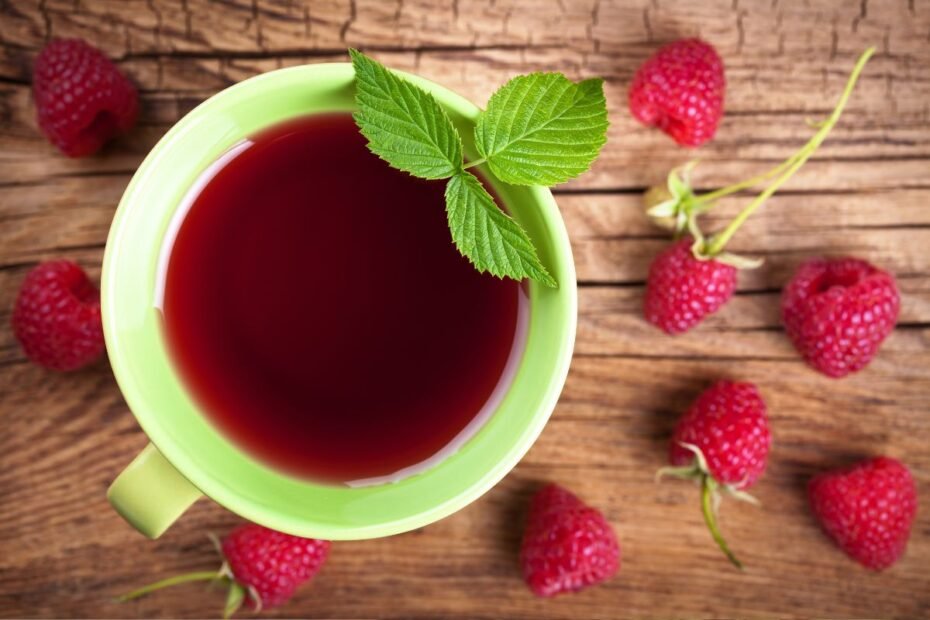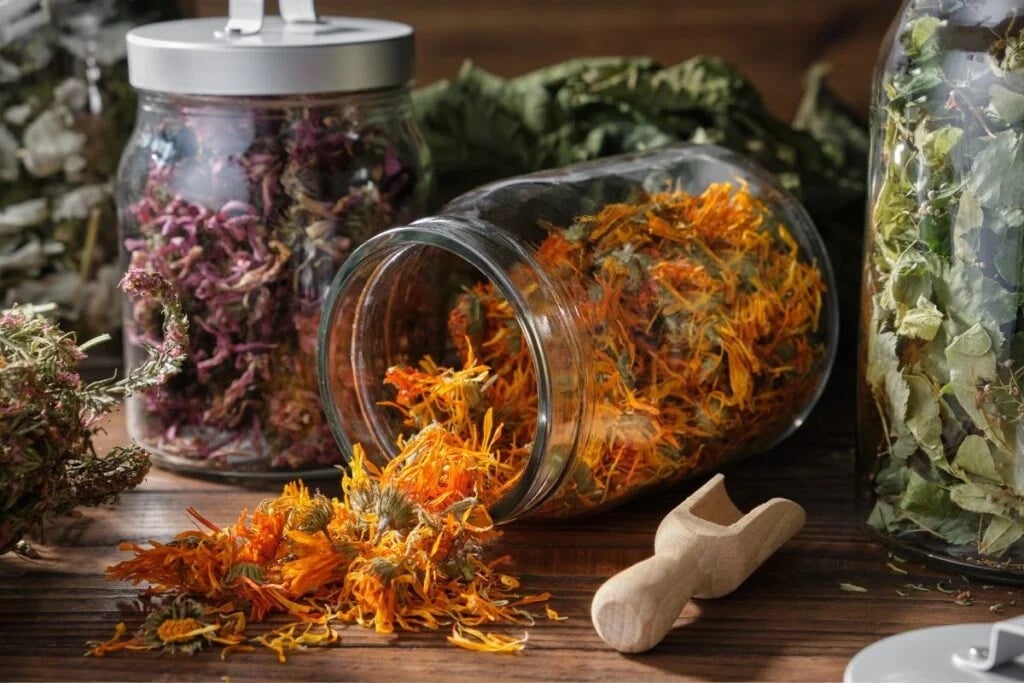The raspberry (Rubus) belongs to the genus Rosaceae, which includes raspberries and blackberries. About 120 species of raspberry are known. The two most common are the red raspberry (Rubus idaeus) and the Arctic raspberry (Rubus arcticus) in Europe and Asia. The berries and leaves of these shrubs make a delicious raspberry tea. You can get the unbeatable benefits of raspberry tea, especially for colds.
Raspberries are perennial shrubs or half-shrubs. The stem is steep, climbing, usually spiny, and 1-3 m tall. Leaves are simple or compound. Flowers are bisexual, white, purple, or pink. Berries are red or yellow. They contain carbohydrates, organic acids, potassium, calcium, iron, vitamin C, provitamin A, vitamin B, aromatic substances, and salicylic acid. Consume fresh or processed raspberry berries.
The raspberry has been a cultivated plant for a long time. It grows best in shelter on moist and loose soils. Both wild raspberries and homegrown raspberries from the garden are suitable for medicinal purposes.
Harvesting, Drying, and Freezing Raspberries
Raspberry berries are harvested between July and August, and the leaves between June and September. A clear day is best after the dew has dried up. Dried forks with flowers and leaves are also used for tea. The collected medicinal raw material is spread thinly in a layer and dried in the shade or in a ventilated room protected from direct sunlight. After drying, raspberries can be stored in cloth bags for up to one year.
You can freeze raspberry berries for the winter, whole or crushed, with or without sugar. Firstly, wash and drain the material, and place it in the freezer in a single layer of foil for a while. Then it freezes, puts the berries in freezer bags or boxes, and puts them in the freezer for a maximum of about a year. Frozen raspberries retain their valuable substances better than dried ones. They promptly thaw when soaked in cold water.
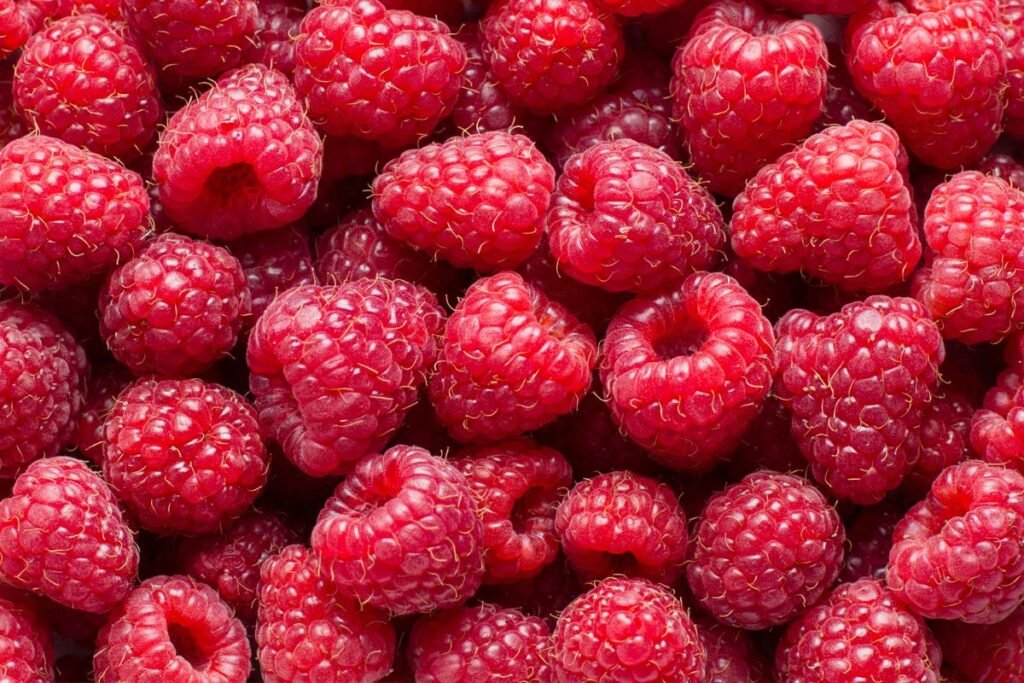
The Benefits of Raspberry Tea
The health benefits of raspberries have been known in folk medicine since ancient times. Recent scientific research has also reinforced their healing properties.
- Raspberry leaves are a good source of antioxidants. They are particularly rich in antioxidant compounds such as ellagitannins, hydroxybenzoic acid, and anthocyanins. Antioxidants can help neutralize free radicals and protect against inflammation and chronic diseases. In addition, raspberry leaves contain small amounts of ellagic acids, which show an anti-cancer effect. Although more research is needed on the potential of raspberry leaves to fight cancer, current results are promising.
- Improves well-being during pregnancy. Midwives have used herbal raspberry teas for a long time to help overcome the negative issues with pregnancy and childbirth. Interestingly, 38% of 121 pregnant women drank raspberry leaf tea during pregnancy in one study. Some women also use this tea during early pregnancy to reduce nausea and vomiting. Some studies suggest that the benefits of raspberry leaf tea include helping strengthen the uterus.
- May help to shorten labor. Some studies suggest that raspberry leaf tea may help to shorten the time of labor and reduce the use of birthing interventions. One older study found that women who drank raspberry leaf tea later in pregnancy were less likely to use various interventions and were less likely to give birth prematurely. Although more research is needed, it is thought that easier childbirth with fewer interventions may reduce postpartum hemorrhage.
Raspberry Tea in Folk Medicine
The folk medicine knows raspberry tea as an excellent remedy for colds. Even traditional medicine practitioners often prescribe this tea. Raspberry tea helps to reduce fever. It is a safe folk remedy and can be safely given to older children. Provided that the child is not allergic to berries or has no individual intolerance. You can include raspberries in children’s diets from the age of 2 years. Raspberry tea is initially given to the child in the form of 1 tablespoon per day. Later, the proportions are gradually increased.
In addition, you can use all parts of raspberry: leaves, berries, stems, and twigs. Take raspberry tea while feverish. It is recommended for adults to drink 1-3 cups a day.

Recipes of Raspberry Tea
All raspberry teas are suitable for coughs, fevers, and sweats. After drinking a cup of this tea, you should lie down and cover up warmly. Raspberry jam also has the same properties as raspberry tea. The berries lose virtually none of their properties when boiled. Therefore, like tea, drinking raspberry jam can help to reduce the temperature and help people with colds and respiratory illnesses recover – these’re essential benefits of raspberry tea.
Raspberry Stem Tea with Pine Needles
You will need:
- a heat-resistant container;
- 50 g dried raspberry stems;
- a few dried raspberry berries;
- 5–10 green pine needles;
- 1 liter of water.
Cut the raspberry stems into pieces and throw them into the boiling water. Boil for 15–20 minutes on low heat. Add the pine needles and raspberries to the boiled tea. Leave the pot covered for another 30–45 minutes. Afterward, strain and drink.
Raspberry Berry Tea
You will need:
- a cup of tea for the preparation;
- 1-2 teaspoons of dried raspberries;
- 200 ml of boiling water.
Cover the dried raspberries with boiling water and leave them to steep for 5–10 minutes. Do not strain the tea before drinking because you can swallow the berries.
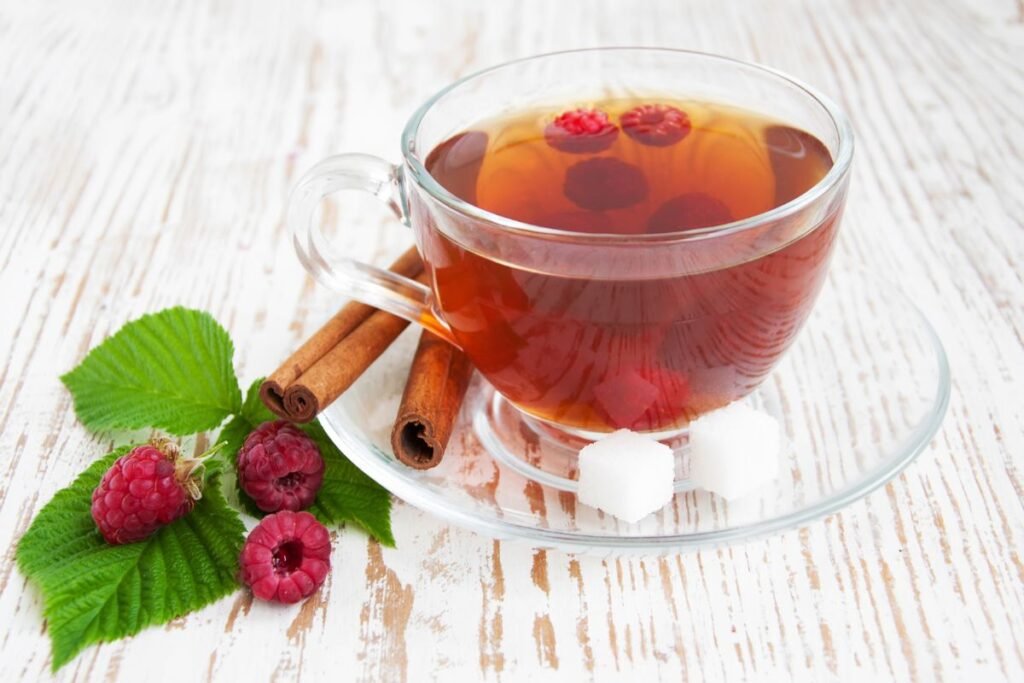
Raspberry Leaf Tea
You will need:
- a heat-resistant container;
- 2 teaspoons of chopped dried or fresh raspberry leaves;
- 400 ml of boiling water.
Cover the raspberry leaves with boiling water and leave for about 20 minutes to steep. Drain the tea before drinking. This tea can help treat inflammation of the respiratory tract and gastritis.
Rowan Leaf and Raspberry Tea
You will need:
- A bowl for brewing the tea
- 2 teaspoons of dried rowan leaves
- 2 teaspoons of dried raspberry leaves
- 1 tbsp. of honey
- 1 l of water.
Pour boiling water over the dried rose hips and raspberries. Leave for a couple of hours, then strain and add a tablespoon of honey. Add 1/3 cup of the prepared tea and fill the rest with hot, boiled water.
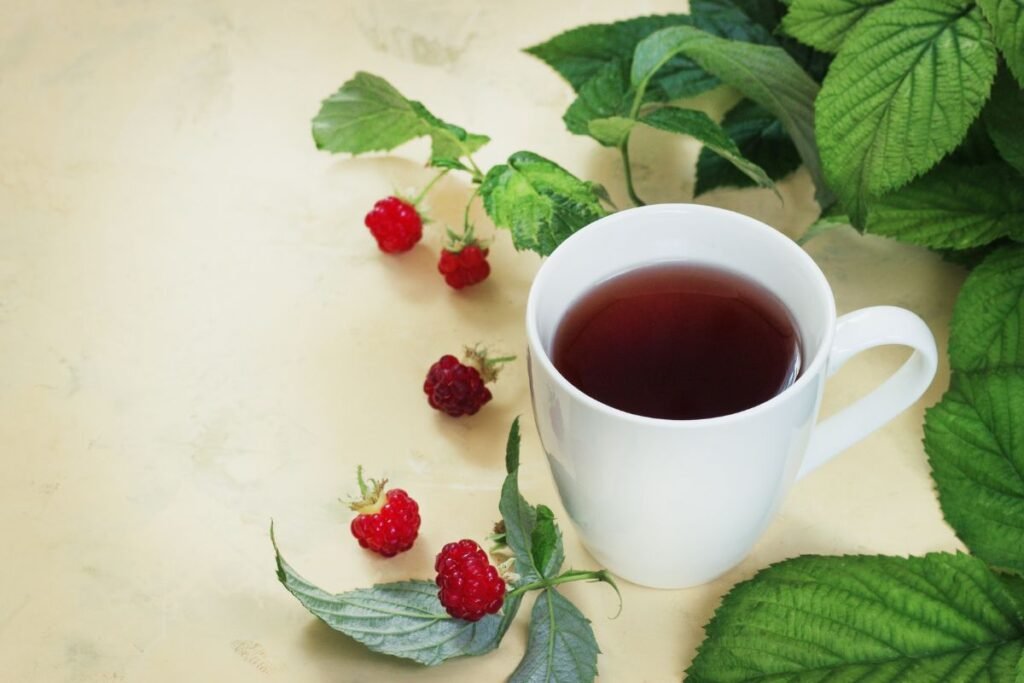
Raspberry Jam
You will need:
- a pot jam for cooking;
- clean, heated jars of the desired size for storing the jam;
- 1 kilo of raspberries;
- 500 grams of sugar for the jam;
Remove the stems from the washed raspberries. Place the raspberries in a saucepan and pour over the jam sugar. Stir everything slightly and rub the berries to extract the juice. Bring the pot to a boil, and once it is boiling, boil for about 5 minutes, stirring constantly. Remove the pot from the stove, then skim off the foam. Strain the jam into the prepared small jars. Close the jam with lids and leave it to cool. Store the jam in a dark, cool place.
What Side Effects Can Raspberry Tea Cause?
Raspberry tea is safe for most people. Even when side effects do occur, they are mild. Some anecdotal evidence suggests that raspberry leaf tea can:
- Have laxative properties.
- Despite its positives, it may have harmful effects on pregnant women. Although there are no official recommendations on how much tea you can drink, most sources recommend not exceeding 1 cup or 220 ml per day during the first trimester and 1-3 cups (220–660 ml) per day during the second and third trimesters. The same recommendations apply to breastfeeding.
- Harm people with diabetes. Raspberries interact with sugar-regulating drugs and should be used with caution if you have diabetes.
- May have side effects in children under 2 years of age.
Sources:
https://www.ncbi.nlm.nih.gov/pmc/articles/PMC4931538/
https://pubmed.ncbi.nlm.nih.gov/31960481/
https://pubmed.ncbi.nlm.nih.gov/32608435/
https://pubmed.ncbi.nlm.nih.gov/28135203/
https://pubmed.ncbi.nlm.nih.gov/35188267/
https://www.ncbi.nlm.nih.gov/pmc/articles/PMC7871383/
Associative photos from © Canva.
